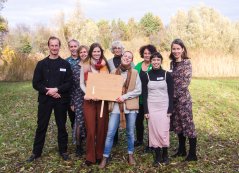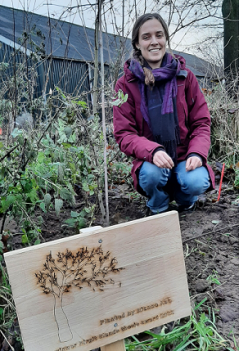Birgit Elands Thesis Award on Human Nature Relationships
The Forest and Nature Conservation Policy group of Wageningen University, the National Forest Service and Natuurcollege set up this award to stimulate and reward students who contribute to our understanding of contemporary human-nature relationships and their role in nature-inclusive societies.
This award was established in 2022 in memory of the late Birgit Elands, who dedicated her career at the Forest & Nature Conservation Policy Group, Wageningen University, to understandng and strengthening human-nature relationships.
The award has been given every year since then for the best university of applied sciences or the best university thesis.
The jury consists of Arjen Buijs and Karin Peters from Wageningen University, Paul Roncken from Natuurcollege and Marjolein Kloek from the National Forest Service (Staatsbosbeheer). Each year, the winner receives 1000 euros and gets to plant a tree in the Wageningn Food Forest.
The previous winners were:
2023:

Winners: Else Vermeulen and Anouk van Heugten (Van Hall Larenstein)
Title of thesis: OmgevingsBelevingsTool (Environmental Experience Tool)
This thesis focuses on designing a tool to stimulate the use of greenery in mental health care. The designed prototype is intended for employees in and around mental health institutions. Practitioners can use the tool as an aid to use nature more often as a treatment room. With knowledge about the effects of nature, managers can design and manage the sites so that they can be used optimally. Read News article.
2022:

Winner: Rianne Kat (Wageningen University; currently a PhD candidate and lecturer in FNP)
Title of thesis: Land Ethics as innovative force
In her MSc thesis, Rianne Kat investigated which ideas, principles and values guide choices surrounding land and transormation initiatives for sustainability. She formulated a renewed perspective on land ethics which represents an alternative to a dominant western land ethic that still prioritises optimisation and intensification of production. With her research, Kat shows that transformational initiatives such as starting food forests or wild picking courses, now often dismissed as unrealistic or too idealistic, are indeed feasible. In fact, they are an important driver of the development of innovative and practical relationships between communities of humans, non-human animals, plants, rocks, soil and water, etc. Read News article.